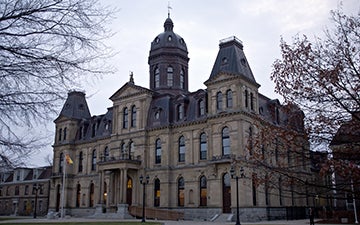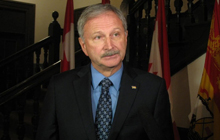New Brunswick: Holt says 'we got a lot done,' but opposition parties beg to differ

A new provincial government concluded its first legislative session with several tax reduction measures but did not remove the so-called Irving Oil gas tax
FREDERICTON, NB, June 9, 2025 – New Brunswick Premier Susan Holt has closed her Liberal government’s first legislative session by speaking with pride about passing affordability measures to help struggling New Brunswickers and creating health-care teams to cut back on the thousands of patients who don’t have a family doctor.
The opposition, on the other hand, honed in on the Liberals’ failure to lower gas prices at the pump and ensure school districts had enough money to avoid staff layoffs.
“We got a lot done,” the premier told Brunswick News on Friday. “I am really proud that we were able to move the needle on major files.”
Among the affordability measures, she mentioned creating a rent cap of three per cent, which led to rents going down in the first quarter “for the first time in ages,” a 10 per cent rebate on NB Power bills, and a 15 per cent reduction in the sales tax on new home construction.
Most importantly, the premier said, her government moved quickly in its first six months to fulfill its promise of creating at least 30 local collaborative family health teams across the province over its mandate, starting with 10 this year.
“If you look at the relationship of this government between nurses and health-care professionals today, they’re optimistic; they’re staying in their jobs. The level of retention has gone up because we’ve shown them respect. We’ve engaged with them in the transformation of primary care and now we’re expanding primary health-care teams in four different places in the province.
“We’re going to see those waiting lists come down. We’re becoming an attractive place for health-care professionals to bring their careers and that’s going to make a difference in New Brunswickers’ lives.”
Glen Savoie, the interim Progressive Conservative leader and chief of the Official Opposition, had a much different take.
“Are New Brunswickers better off based on what’s happened in that chamber?” he asked. “Can people sense a difference when it comes to affordability, the price of gas, access to health care? Has it really improved with the work they’ve done in there? Not at all.”
The Tories have been critical of the Liberals for failing on two big promises: delivering balanced budgets (the current projection is for a deficit of well over $500 million) and removing the carbon adjustor that would have knocked off several cents for each litre of fuel at the pumps.
Deputy Premier René Legacy, who is also finance and energy minister, has argued that tax windfalls that Ottawa delivered in previous years have dried up and that the carbon adjustor was more complicated than the Liberals initially thought.
An Act Respecting Petroleum Products Pricing passed royal assent on Friday, but it does not mean that gas prices will go down. The law allows the provincial cabinet to decide if it should eliminate the carbon adjustor, which many critics refer to as the “Irving Oil gas tax” because the previous Tory government created it to allow the company’s Saint John refinery to pass on extra costs caused by Ottawa’s clean fuel measures.
However, there’s fear that without the adjustor, independent gas stations and distributors, particularly in rural areas, would be forced to swallow those extra costs and be put out of business.
The Liberals listened to those arguments and have paused pulling the trigger on the bill until after the New Brunswick Energy and Utilities Board can study the matter further, along with normal retail margins, later this summer.
Holt has also toyed with the idea of getting rid of gas regulations altogether.
Her government and Education Minister Claire Johnson also endured plenty of criticism over the last several months because of cutbacks at school districts that would see staff positions change and the elimination of scores of librarians.
Johnson countered by saying the Liberals wanted more resources dedicated to classroom teaching and an improvement in low student test scores.
To quell the controversy, the government recently entered into negotiations with the seven school districts to see if part of the $43 million in cuts could be restored, with the minister hinting they could land somewhere in the middle before the end of the school year in two weeks.
On Friday, New Brunswick Lieutenant Governor Louise Imbeault visited the legislative assembly and gave royal proclamation to 34 of 36 bills that had been presented since the first sitting Nov. 19, passing them into law.
Among the more important bills to pass into law were the property tax assessment freeze (the Liberals say they put the measure in place until they can properly reform the property tax system next year) and legislation that makes an expensive travel nurse contract between the regional health authority serving mostly francophone communities, the Vitalité Health Network, and the private firm Canadian Health Labs null and void.
There’s also a provision in the law stating that the health authority, the health minister and the provincial government cannot be sued for breaking the contract.
Savoie struggled to say anything good that the Liberals had done. After being pressed by reporters, he agreed that Liberal MLAs did the right thing by backing a motion put forward by former Tory cabinet minister and Sussex-Three Rivers MLA Tammy Scott-Wallace to declare intimate partner violence an epidemic in New Brunswick.
The motion passed on Thursday evening unanimously, just like a similar motion was passed by the Nova Scotia legislature last September in the wake of the 2020 tragedy when a crazed man beat and tied up his girlfriend in Portapique, near the New Brunswick border, before going on a rampage and killing 22 people. RCMP shot him dead. His girlfriend, who had been abused for years, hid in the woods and survived.
Savoie also applauded the Liberals for agreeing to a permanent calendar at the legislature. Earlier in the session, the government had threatened to pass a motion to hold sittings until midnight unless the Tories stopped filibustering on bills. In the end, though, the Liberals’ legislation all got through before the end of the session.
The one exception was the sole bill the small opposition Green party had been allowed to introduce, An Act Respecting the Right to a Healthy Environment.
The environmental rights bill will be sent to the law amendments committee, likely in September, for further review because the Liberals and Tories were worried the bill went too far and would be a job killer. They want to hear from various experts, including First Nations, before taking next steps.
Green party Leader David Coon, who introduced the bill, told reporters Friday he doesn’t mind if the bill is amended heavily. It could then pass third reading and gain royal assent before a new session of the legislature in November.
“As long as the right to a healthy environment is enshrined in law through that bill, that’s the key,” Coon said. “As long as it’s there, New Brunswickers have more access to uphold their rights in the courts.”
John Chilibeck is a Local Journalism Initiative Reporter with The Daily Gleaner in Fredericton, New Brunswick. Title image: New Brunswick Legislature by Breau is licensed under CC BY-SA 4.0.










(0) Comments